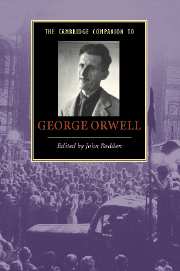Book contents
- Frontmatter
- 1 A political writer
- 2 Orwell and the biographers
- 3 Englands His Englands
- 4 The truths of experience: Orwell’s nonfiction of the 1930s
- 5 The fictional realist: novels of the 1930s
- 6 Orwell’s essays as a literary experience
- 7 ‘My country, right or left’: Orwell’s patriotism
- 8 Orwell and the British Left
- 9 Orwell, anti-Semitism and the Holocaust
- 10 Orwell, Socialism and the Cold War
- 11 Animal Farm: history as fable
- 12 Nineteen Eighty-Four: context and controversy
- 13 Orwell, the academy and the intellectuals
- 14 Orwell for today’s reader: an open letter
- 15 George Orwell: a bibliographic essay
- 16 Why Orwell still matters
- Further reading
- Index
9 - Orwell, anti-Semitism and the Holocaust
Published online by Cambridge University Press: 28 July 2007
- Frontmatter
- 1 A political writer
- 2 Orwell and the biographers
- 3 Englands His Englands
- 4 The truths of experience: Orwell’s nonfiction of the 1930s
- 5 The fictional realist: novels of the 1930s
- 6 Orwell’s essays as a literary experience
- 7 ‘My country, right or left’: Orwell’s patriotism
- 8 Orwell and the British Left
- 9 Orwell, anti-Semitism and the Holocaust
- 10 Orwell, Socialism and the Cold War
- 11 Animal Farm: history as fable
- 12 Nineteen Eighty-Four: context and controversy
- 13 Orwell, the academy and the intellectuals
- 14 Orwell for today’s reader: an open letter
- 15 George Orwell: a bibliographic essay
- 16 Why Orwell still matters
- Further reading
- Index
Summary
In May 1949, the American journal, Partisan Review, carried a contribution by George Orwell to the controversy surrounding the award of the Bollingen Prize for Poetry to Ezra Pound earlier that year. Pound's fascist sympathies, his violent anti-Semitism and his wartime collaboration inevitably called into question the judges' decision so soon after the war. In his contribution, Orwell argued that as far as he was concerned if Pound's poetry was judged deserving of the prize then it should be awarded to him regardless of his politics. Nevertheless, he went on to insist that 'one ought to keep Pound's career in memory and not feel that his ideas are made respectable by the mere fact of winning a literary prize'. Pound, he pointed out, was 'an ardent follower of Mussolini . . . and never concealed it'. His embrace of fascism was quite open and unashamed, although Orwell believed that his underlying motivation was, in fact, hatred of Britain and the United States, and more particularly, of 'the Jews'. Pound's wartime broadcasts for fascist Italy 'were disgusting' and Orwell remembered 'at least one in which he approved the massacre of the East European Jews and “warned” the American Jews that their turn was coming presently'. If the murder of the Jews 'in the gas vans' had still been going on, then the decision to award Pound the prize would have been 'undesirable', but this was no longer the case. If the judges believed Pound's poetry worthy of the prize then he should receive it, but, Orwell went on, they should have stated 'more firmly' that Pound's political opinions were 'evil'. The very deliberate use of the word 'evil' here is quite unusual in Orwell's writings. He made the point in an aside that he personally thought Pound's poetry 'entirely spurious'.
- Type
- Chapter
- Information
- The Cambridge Companion to George Orwell , pp. 112 - 125Publisher: Cambridge University PressPrint publication year: 2007

